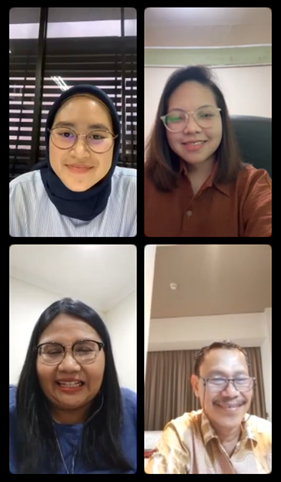In celebration of National Education Day on May 2nd, UI GreenMetric collaborated with Universitas Terbuka (UT), Institut Teknologi Sepuluh Nopember (ITS), and Carbon Ethics to explore the integration of sustainability education for green job opportunities to empower future leaders. The discussion featured distinguished experts: Prof. Imam Farisi, Head of the Green SDGs at UT; Dr. Susi Wilujeng, Head of the Smart Eco Campus Development Unit at ITS; and Natalia Christiani, M.Si., Project Manager at Carbon Ethics. Each expert provided valuable insights into how their respective institutions and organizations are advancing sustainability education to equip the next generation with the knowledge and skills needed for a sustainable future.
In a discussion involving three expert speakers, the discussion started with how to measure the effectiveness of sustainability education (both formal and non-formal) in preparing future generations to face environmental challenges and green job opportunities. Prof. Imam emphasized the importance of three key aspects: structured planning, process, and results. He highlighted the need to evaluate effectiveness by examining participation levels, satisfaction, and outcomes. He also pointed out that sustainability education should encompass a wide range of courses, with a particular focus on practical programs and contextual curricula tailored to regional needs.
Moreover, Dr. Susi discussed the ambitious goal of Indonesia Emas in year 2030, which aims to have 4.4 million human resources in green jobs. She shared her university’s experience in the introduction of a special curriculum in 2023 that focuses on the green economy and includes tracer studies for alumni to evaluate the performance of education and partnerships. She mentioned the importance of inclusive education that involves educational institutions, government, private sector, and NGOs to create green job opportunities and highlighted the need for a collaborative approach to sustainability education.
Natalia added to the discussion by talking about the importance of curriculum evaluation through alumni surveys, which provide valuable feedback to educational institutions. She emphasized that sustainability education should include both formal and non-formal elements, with a strong focus on practical knowledge and case studies. She also underscored the significance of providing volunteer opportunities to increase interest and awareness of environmental issues among students and the broader community.
The speakers agreed that sustainability education plays a crucial role in an era of globalization and increasingly complex environmental challenges. This education focuses not only on environmental protection but also includes social and economic aspects, preparing future generations to be more resilient to environmental and climate issues. They highlighted the need for collaboration between universities, educational institutions, government, private sector, and local communities to create relevant curricula that are up-to-date with environmental issues, policies, regulations, and funding. Raising awareness through education and the use of environmentally friendly technologies that support sustainable development, as well as providing practical experiences and volunteer opportunities, were identified as essential steps in integrating sustainability education and creating inclusive and sustainable solutions.

Streaming Live on: https://www.instagram.com/p/C7ER0JAy4z5/
Written by: Yovita Y. Yamin